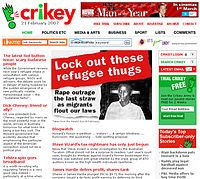- Crikey
-
This article is about the Australian political website. For the exclamation, see Minced oath. For the snail from Australia from the family Camaenidae, see Crikey steveirwini.
Crikey is an independent Australian electronic magazine comprising an open access website and an email newsletter available to subscribers. Well known in Australian political, media and business circles, Crikey was described by former Federal Opposition Leader Mark Latham as the "most popular website in Parliament House" in The Latham Diaries[1]. It has reported on unpopular opinions and broken stories not found in more mainstream media outlets.
Contents
History
Crikey was founded by activist shareholder Stephen Mayne, a journalist and former staffer of then Liberal Victorian premier Jeff Kennett. It developed out of Mayne's "jeffed.com" website, which in turn developed out of his abortive independent candidate campaign for Kennett's seat of Burwood. Longstanding Crikey political commentators/reporters include former Liberal insider Christian Kerr (who originally wrote under the pseudonym 'Hillary Bray')[2], Guy Rundle, Charles Richardson, Bernard Keane, Mungo MacCallum and Hugo Kelly.
In 2003 Stephen Mayne, the then proprietor, was forced to sell his house in order to settle defamation cases brought by radio presenter Steve Price and former ALP senator Nick Bolkus over comments posted about them by Crikey.[3]
Staff of then Treasurer Peter Costello banned Crikey from the 2005, 2006 and 2007 Budget 'lock ups', in which financial journalists are shown the Federal Budget papers some hours in advance so that their publications can report the Budget in depth as soon as it is released, on the grounds that Crikey is not considered to be part of the "mainstream media".
Sale to Private Media
On February 1, 2005, it was announced that Stephen Mayne had sold Crikey to Private Media Partners, another independent media operator in Australia, owned by former Editor-in-chief of the Sydney Morning Herald, Eric Beecher, for A$1 million. Under the agreement, Mayne continues to write for Crikey as a business commentator.[4]
Under PMP's stewardship the publication aimed for "professional" style, avoiding the use of in-house nicknames and other idiosyncrasies of the original Crikey. In February 2006 the Age reported that former writer, Hugo Kelly, had been sacked on the grounds of professional misconduct.[5]
See also
- Journalism in Australia
- First Dog on the Moon
References
- ^ Mark Latham, The Latham Diaries, Melbourne University Press, Carlton, 2005, p 403.
- ^ Brown, Susan (4 July 2004). "Crikey! Name behind column comes clean on dishing dirt". The Age (Melbourne). http://www.theage.com.au/articles/2004/07/03/1088488200420.html. Retrieved 23 August 2009.
- ^ Shiel, Fergus (7 May 2003). "Legal web snares Crikey publisher". The Age (Melbourne). http://www.theage.com.au/articles/2003/05/06/1051987702129.html. Retrieved 22 August 2009.
- ^ Carbone, Suzanne (3 February 2005). "Mayne finds a million reasons to sell". The Age (Melbourne). http://www.theage.com.au/news/National/Mayne-finds-a-million-reasons-to-sell/2005/02/02/1107228768929.html. Retrieved 22 August 2009.
- ^ Westerman, Helen; Urban, Rebecca (16 February 2006). "Crikey! You've got to watch what you say". The Age (Melbourne). http://www.theage.com.au/news/business/crikey-youve-got-to-watch-what-you-say/2006/02/15/1139890806140.html. Retrieved 22 August 2009.
External links
Categories:- Australian political websites
- Journalism in Australia
- Australian media
- Digital newspapers published in Asia
Wikimedia Foundation. 2010.

